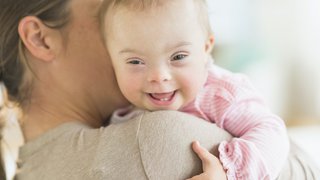Pet ownership may be a good way to boost your baby's health
January 12, 2021

If you're a dog lover like me, you know that owning a pet benefits your life in many ways. But new research suggests owning a furry friend – especially a dog – may also improve your newborn's health.
According to the 2019-2020 National Pet Owners Survey, 67% of U.S. households own a pet, and more than 63% of those pets are dogs.
Multiple research studies have shown the health benefits of pet ownership, such as:
- Decreased cholesterol and triglyceride levels
- Lower blood pressure
- Feeling less lonely or stressed
- Increased activity levels
- More opportunities for socialization
Growing evidence also suggests that exposure to household pets, particularly dogs, during pregnancy and infancy may increase immunity and help lower the baby's risk of health problems such as allergies and asthma.
I invited my colleague, Andrew Bird, M.D., a UT Southwestern pediatrician who specializes in allergies and immunology, to discuss the potential benefits your canine companion may have on your newborn's health.
Pets and immune systems

Researchers have been looking into the health effect of pets on babies and children for decades, and some of that data has proven conflicting. But a study reported at the 2020 American College of Allergy, Asthma & Immunology meeting showed that owning a dog while pregnant could positively influence a child’s immune system into adolescence.
The researchers have been following 1,193 mother-child pairs since 2003 and found that immunoglobulin E (IgE) levels were 28.8% lower in children with prenatal pet exposure compared with children whose mothers had no pet.
IgE is a type of antibody made by the immune system that primarily binds to allergens and contributes to causing an allergic reaction. Higher amounts of IgE in a person’s blood is associated with increased sensitivity to common allergens and conditions such as asthma, food allergies, and atopic dermatitis (eczema).
Dog ownership appeared to have the highest impact, with 26.7% lower IgE levels, a trend that appears to have continued through the child’s teen years. Cat ownership, however, did not show a significant effect on IgE levels.
One theory about why dogs influence IgE is that dogs tend to bring bacteria found outside into the home, influencing the child's early microbiome (gut bacteria). This drives the immune system to mature and avoid developing allergies.
A 2017 study found that babies whose mothers had dogs or cats in the home during pregnancy had higher levels of two gut microbes: Ruminococcus and Oscillospira, which have been linked to lower odds of allergies and obesity, respectively.
And a 2019 study found that infants who lived with dogs were 90% less likely to develop food allergies. Of the babies who lived with at least two dogs, none developed a food allergy.
Though preliminary data suggest benefits, it’s important to note that these studies don’t necessarily prove that pets directly prevent allergies and disease. It’s difficult to design a trial to test hypotheses like this because there are so many variables: type of pet, breed, maternal or infant contact with the pet, parental allergies, and exposure to other allergens, just to name a few.
Pet ownership when a parent has allergies
It’s not unheard of for a dog person to find someone special who happens to be allergic to dogs. Whether you're the dog person or the sneezing significant other, these strategies can help keep your family happy and sniffle-free.
No pets in bed
Minimize your partner's exposure to the animal's hair and dander by banning pets from the bedroom. Wash the bedding, sweep, and vacuum often to reduce animal allergens in the home.
Rethink furniture and air quality
Homeowners might consider replacing carpet with hard surfaces for easier cleaning. Choose furniture with washable coverings and limit upholstered fabrics, which are notorious for collecting allergens. Installing a HEPA-certified air filter also might help reduce airborne hair and dander.
Consider allergy medication
Over-the-counter medications such as an antihistamine or decongestant may help relieve pet allergy symptoms. If the allergies are severe, allergy shots may make breathing and sleeping more comfortable. If you are getting allergy shots and become pregnant, some allergists may continue the shots, but they typically do not increase the dose until after you gave birth. Allergy shots are not typically initiated during pregnancy.

A few final thoughts
There are a few things pregnant women need to consider if they have a pet:
- Avoid common toxins such as flea and tick medications. You’ll also want to hand off cat litter duty. Darn, right?
- Prevent pets over 40 pounds from jumping or landing on your belly to avoid potentially harming your baby.
- Watch where you step – animals can also be tripping hazards.
You’ll also want to prepare your pet to welcome the newborn home while you're still pregnant, which will make the transition safer for your baby and less stressful for your cuddly critter. Consider taking a trip to obedience school, and make sure your furry friend is up to date on its vaccinations.
Remember, pets can be a big investment of time and money. If you're considering getting a pet, do your research – find out how often the animal you want will need to be fed, watered, walked, and taken to the vet. Make sure you can keep that commitment after your new baby arrives.
If pet ownership isn't right for you, the baby can still benefit by visiting your friends' or family members' pets.
Pet ownership can bring joy and excitement to your life. If you have questions about pet ownership and pregnancy, call 214-645-8300 or request an appointment online.










